Germanic Wars
Topic: History
 From HandWiki - Reading time: 21 min
From HandWiki - Reading time: 21 min
"Germanic Wars" is a name given to a series of wars between the Romans and various Germanic tribes between 113 BC and 596 AD. The nature of these wars varied through time between Roman conquest, Germanic uprisings and later Germanic invasions in the Roman Empire that started in the late 2nd century BC. The series of conflicts, which began in the 5th century under the Western Roman Emperor Honorius, led (along with internal strife) to the ultimate downfall of the Western Roman Empire.
- Cimbrian War, 113–101 BC
- Battle of Vosges 58 BC
- Battle of the Sabis 57 BC
- Clades Lolliana 16 BC
- Early Imperial campaigns in Germania, 12 BC – AD 16
- Battle of Arbalo 11 BC
- Battle of the Lupia River 11 BC
- Battle of the Teutoburg Forest 9 AD
- Campaign against the Marsi 14
- Campaign against the Chatti 15
- Campaign against the Bructeri 15
- Battle at Pontes Longi 15
- Battle of Idistaviso 16
- Battle of the Angrivarian Wall 16
- Campaign against the Chatti 16
- Battle of Baduhenna Wood 28
- Revolt of the Batavi 69-70
- Domitian's Campaign against the Chatti 82
- Marcomannic Wars 166–180
- Battle of Carnuntum 170
- Crisis of the Third Century 235–284
- Battle at the Harzhorn c. 235
- Battle of Nicopolis ad Istrum 250
- Battle of Beroe 250
- Battle of Philippopolis 250
- Battle of Abrittus 251
- Siege of Thessalonica 254
- Battle of Thermopylae 254
- Battle of Mediolanum 259
- Battle of Augusta Vindelicorum 260
- Siege of Mainz 268
- Battle of Lake Benacus 268
- Battle of Naissus 269
- Battle of Placentia 271
- Battle of Fano 271
- Battle of Pavia 271
- Battle of Lingones 298
- Battle of Vindonissa 298
- German and Sarmatian campaigns of Constantine 306–336
- Siege of Senonae 356
- Siege of Autun 356
- Battle of Durocortorum 356
- Battle of Brumath 356
- Battle of Argentoratum 357
- Battle of Solicinium 367
- Great Conspiracy 367–368
- Gothic War (376–382)
- Battle of Marcianople 376
- Battle of the Willows 377
- Battle of Dibaltum 377
- Battle of Adrianople 378
- Siege of Adrianople (378)
- Battle of Constantinople (378)
- Battle of Thessalonica 380
- Battle of Argentovaria 378
- Massacre of Thessalonica 390
- Battle of the Frigidus 394
- Gothic War (402-403)
- Siege of Asti 402
- Battle of Pollentia 402
- Battle of Verona 403
- Battle of Faesulae 406
- Battle of Moguntiacum 406
- Crossing of the Rhine 406
- Sack of Rome 410
- Siege of Hippo Regius 430–431
- Battle of Narbonne 436
- Battle of the Catalaunian Plains 451
- Sack of Aquileia 452
- Sack of Rome 455
- Battle of Aylesford 455
- Battle of Órbigo 456
- Battle of Arelate 458
- Battle of Cartagena 461
- Battle of Orleans 463
- Battle of Bassianae 468
- Battle of Cap Bon 468
- Battle of Bolia 469
- Battle of Déols c. 469
- Battle of Ravenna 476
- Battle of Soissons 486
- Battle of Isonzo 489
- Battle of Verona 489
- Battle of the Adda River 490
- Vandalic War 533-534
- Battle of Ad Decimum 533
- Battle of Tricamarum 533
- Gothic War (535–554)
- Siege of Naples 536
- Siege of Rome 537-538
- Battle of Treviso 541
- Siege of Verona 541
- Battle of Faventia 542
- Battle of Mucellium 542
- Siege of Naples 543
- Sack of Rome 546
- Siege of Rome 549-550
- Battle of Sena Gallica 551
- Battle of Taginae 552
- Battle of Mons Lactarius 553
- Battle of the Volturnus 554
- Byzantine–Lombard wars 568–750
Chronology
2nd century BC
- 113–101 BC, Germanic Collision with the Roman Republic, Cimbrian War, Begin of Germanic Wars.
- 112 BC, Battle of Noreia,[1] Suicide of Consul Gnaeus Papirius Carbo.
- 107 BC, Helvetii defeat the Romans in the Battle of Agen,[2] Consul Lucius Cassius Longinus dies in battle,[2] General Lucius Calpurnius Piso Caesoninus dies in battle.[2] (Battle against Allies of the Cimbri)
- 105 BC, Battle of Arausio, Execution of Roman General Marcus Aurelius Scaurus, Proconsul Quintus Servilius Caepio and Consul Gnaeus Mallius Maximus exiled.
- 102 BC, Consul Gaius Marius defeats the Scirii and Teutons in the Battle of Aquae Sextiae, Capture of King Teutobod, Extermination of the Teutons, Cimbri defeat Consul Quintus Lutatius Catulus in the Adige Valley.[4]
- 101 BC, Roman consuls Gaius Marius and Manius Aquillius defeat the Cimbri in the Battle of Vercellae,[3] King Boiorix dies in battle,[3] Extermination of the Cimbri.[3]
1st century BC
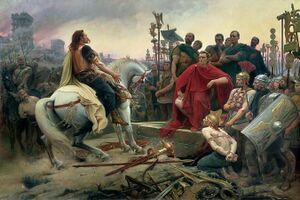
- 58–51 BC, Conquest of Celtic Gaul to the Rhine by Julius Caesar, Gallic Wars.[5]
- 58 BC, Caesar decisively defeats the Helvetii in the Battle of the Arar and the Battle of Bibracte, Caesar decisively defeats the Suevi, led by Ariovistus, in the Battle of Vosges.[6][7]
- 57 BC, Battle of the Sabis.
- 55 BC, Caesar's intervention against Tencteri and Usipetes, Caesar defeats a Germanic army then massacres the women and children, totalling 430,000 people, somewhere near the Meuse and Rhine rivers, Caesar's first crossing of the Rhine against the Suevi, Caesar's invasions of Britain.
- 54 BCE, Destruction of the legion Legio XIV Gemina by the Eburones led by Cativolcus and Ambiorix,[8][9] Lucius Aurunculeius Cotta dies in battle, Quintus Titurius Sabinus dies in battle.
- 53 BC, Caesar's retaliation against the Eburones second crossing of the Rhine, Extermination of the Eburones.
- 52 BC, Fall of Celtic Gaul, Gaul becomes a Roman province.
- 46 BC, Execution of Vercingetorix the Celt.[10]
- 30–29 BC, Rebellion of the Morini and Treveri with aid of the Suebi crushed by proconsuls Gaius Carrinas and Gaius Cornelius Gallus.[11]
- 20 BC, Marcus Vipsanius Agrippa, Governor of Transalpine Gaul, Construction of military roads and especially the military road Lugdunum--Divodurum--Treverorum--Agrippinensium (from Lyon to Cologne).
- 16 BC, clades Lolliana,[12] Destruction of the legion Legio V Alaudae by Sicambri and their allies, Fall of the Kingdom of Noricum.
- 16–13 BC, Emperor Augustus on the Rhine, Reorganization of the Three Gauls (capital Trier), Decision to fortify the left bank of the Rhine and conquest of Germania to the Elbe, Rome pays tribute to the Frisii, Begin of invasions east of the Rhine by Rome, Construction of the modern city of Mainz begins.
- 12–9 BC, Invasions of Drusus I up the Elbe from the North Sea, the Lippe and Main, Battle of the Lupia River, Cherusci, Marsi and Sicambri[13] subdued, Chatti, Mattiaci, Tencteri and Usipetes are overrun, Frisii and other the Germans along the lower Rhine defeated,[14] Canal of Drusus constructed,[15] Establishment of new forts by Rome of Haltern am See, Xanten, Haltern, Oberaden, Holsterhausen, Anreppen and Beckinghausen.[16]
- 9 BC, Creation of Magna Germania (capital Cologne), Pacification campaigns against the Germanic tribes by the Roman Empire, Marcomanni defeated and forced to flee into the territory of the Boii.[17]
- 8-7 BC, Construction of military forts on both sides of the Weser, Deportation of 40,000 Sicambri and Suebi west of the Rhine.[18][19][20]
- 6–2 BC, Lucius Domitius Ahenobarbus leads a Roman army across the Elbe. Construction of military roads, called the pontes longi, amid the vast swamps between the Rhine and the Ems.[21] Hermunduri subdued and forced to flee into the territory of the Marcomanni.[22]
1st century
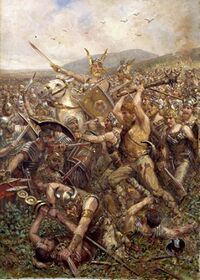
- 1–4 AD, Rise of the Chatti[23][24] and Bructeri (immensum bellum)[25] suppressed by Tiberius, who reaches the Elbe. Canninefates, Chattuarii, Cherusci are again subdued. Lombards, Semnones, Chauci and other tribes who dwelt on both sides of the Elbe are subjugated.[26]
- 5, The Roman navy reaches the Cimbrian peninsula for the first time. Cimbri, Charudes, Semnones and other Germanic tribes who inhabit the region declare themselves friends of the Roman people.[27][28]
- 6–9, Uprising in Illyricum, which cancels the major Roman project of war against Suevic Marcomanni. Romans forced to move eight of eleven legions present in Magna Germania to crush the rebellion in the Balkans and Pannonia.[29]
- 6, Varus succeeds Saturninus as governor of Germania with the mission of peacekeeping and the implementation of tax and judicial administration.
- 9, clades Variana, Destruction of the legions XVII, XVIII and XIX by Arminius in the Battle of Teutoburg Forest, Suicide of Administrator Varus, Loss of military camps east of the Rhine.,[30][31][32] Roman Empire is forced to strategically withdraw from Germania. Pro-Roman Germanic coalition led by Maroboduus and Segestes turns against Arminius.[33] The resistance of the Roman garrison of Aliso and the arrival of Roman reinforcements on the Rhine prevent Arminius from invading Gaul.[34]
- 10–13, Military command of Tiberius in Germania and interventions in the valley of the Lippe, replaced by Germanicus, Construction of Limes Germanicus begins.
- 14, Mutiny of the legions of Germania.
- 14–16, Roman retaliation against Cherusci, Chatti, Bructeri and Marsi, capture of Thusnelda, recovery of two legionary standards lost in the Battle of the Teutoburg Forest.
- Battles of Idistaviso and the Angrivarian Wall.
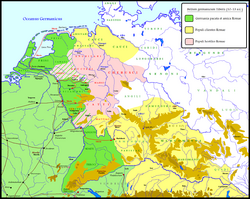
- 17, Cessation of military offensives east of the Rhine by Tiberius, Civil war between pro-Roman and anti-Roman Germanic tribes ends in a stalemate.[35][36]
- 19, Death of Germanicus.
- 21, Assassination of Arminius.
- 28, Revolt of the Frisii, Tax collectors hanged, Romans defeated in the Battle of Baduhenna Wood.
- 41, Raid against the Chauci under Emperor Claudius, Recovery of third legionary standard lost in the Battle of the Teutoburg Forest.
- 47, Cnaeus Domitius Corbulo crosses the Rhine, defeats the Frisii and Chauci and occupies their territory.[37][38]
- 50, Raid against the Chatti under Emperor Claudius, Liberation of Roman prisoners.[39]
- 54, Under Emperor Nero, Frisian raid repulsed.[40]
- 69–70, Revolt of the Batavi, Destruction of 2 Roman legions by the Batavi, Rebellion crushed by Quintus Petillius Cerialis.[41]
- 72, Under Emperor Vespasian, Romans occupy and settle the Agri Decumates.
- 82–83, Campaign against the Chatti under Emperor Domitian, Roman armies conquer the territory of Chatti with the help of Mattiaci, Hermunduri and Cherusci, Triboci and Nemetes subdued, Establishment of new Roman forts of Ladenburg, Neuenheim, Ladenburg, Sulz, Geislingen, Rottenburg an der Laaber, Burladingen, Gomadingen, Donnstetten, Urspring, Günzburg.[42][43][44][45]
- 89, Lucius Antonius Saturninus, Legio XIV Gemina and Legio XXI Rapax revolt against Rome with aid of the Chatti.[46]
2nd century
- c. 165, Invasion of Pannonia by Lombards and Ubii.
- 166–180, Germanic tribes invade the frontiers of the Roman Empire, specifically the provinces of Raetia and Moesia, Marcomannic Wars.
- 180, Goths reach the banks of the Black Sea.
3rd century
- 213–214, Emperor Caracalla's successful campaign against the Alamanni, fortifications of Raetia and Germania Superior strengthened.[47]
- 235–284, Crisis of the Third Century.
- 235, Battle at the Harzhorn.
- 238, Gothic raid on Istria,[48]
- 248–249, Raid in Marcianopolis by Goths.[48]
- 250, Roman victory at the Battle of Nicopolis ad Istrum. Gothic victory at the Battle of Beroe. Siege and sack of Philippopolis by Goths led by Cniva.[49]
- 251, Three Roman legions defeated by Goths at the Battle of Abritus, Emperor Decius dies in battle, Co-Emperor Herennius Etruscus dies in battle.
- 254, successful Graeco-Roman defense of Thessalonica at the Siege of Thessalonica. Successful Graeco-Roman defense of Achaea at the Battle of Thermopylae.
- 259, 300,000 Alemanni die in the Battle of Mediolanum (Milan).
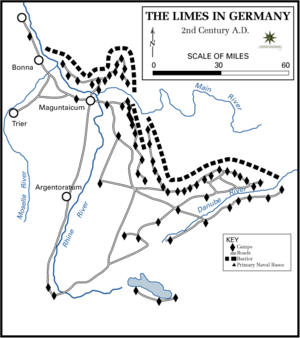
- 259–260, Evacuation of the agrarian area Agri Decumates by the Roman Empire, Roman Empire retreats behind the Rhine.
- 260–274, Usurper Postumus, of possible Batavian origin,[50] declares himself Emperor of the Gallic Empire including Roman Gaul, Roman Britain, Roman Spain and Germania. He assumed the title Germanicus Maximus after successfully campaigning against Franks and Alamanni.[51]
- c. 267–269, Invasion of the Goths, Gothic attacks on Marcianopolis and Chrysopolis, Sack of Byzantium.
- 268, Siege of Mainz, Battle of Lake Benacus, assassination of Gallic Emperor Postumus.
- 269, Battle of Naissus,[52] end of Gothic Invasion.
- 271, Battle of Placentia, Battle of Fano, Battle of Pavia, Destruction of Alemannic army, Emperor Aurelian repelled another Gothic invasion but abandoned the province of Dacia north of Danube forever,[53] Construction of the Aurelian Wall begins.
- 277–278, Emperor Probus's successful campaigns against Goths, Alamanni, Longiones, Franks and Burgundians.[54]
- 286, Campaign against the Alamanni, Burgundians, Heruli and Chaibones under Emperor Maximian.
- 287-288, Salian Franks, Chamavi and Frisii surrender and become subjects of the Roman Empire. Maximian move them to Germania Inferior to provide manpower and prevent the settlement of other Germanic tribes.[55][56]
- 292, Constantius defeat the Franks who had settled at the mouth of the Rhineand and deport them to the nearby region of Toxandria providing a buffer along the northern Rhine and reducing his need to garrison the region.[55]
- 296, Frisians deported into Roman territory as laeti.[57]
- 298, Battle of Lingones.
- 298, Battle of Vindonissa.
4th century
- 306–310, Emperor Constantine the Great drives the Franks back beyond the Rhine and captures two of their kings, Ascaric and Merogaisus. The prisoners are fed to the beasts of Trier's amphitheater in the adventus (arrival) celebrations that followed.[58] Constantine crosses the Rhine in 308 and 310, devastating the lands of the Franks and the Bructeri.[59]
- 332, Roman invasion north of the Danube under Emperor Constantine the Great. Capture of Gothic Prince Ariaricus. Nearly one hundred thousand Goths die before submitting to Rome.[60][61][62][63][64][65]
- 306-337, After thirty years of military campaigns Constantine regains control over a good part of the territories which had been abandoned by Gallienus and Aurelian. This included the Agri decumates from the Alemanni, the plain south of the Tisza (Banat) from the Sarmatians and Oltenia & Wallachia from the Goths.[66][67][68]
- c. 350, Infiltration of Germania Inferior by Franks.
- 354–355, Roman double victory over Alamanni under Emperor Constantius II.[69][70]
- 356, Recapture of Colonia Agrippina (Cologne) by Julian the Apostate, Siege of Senonae by Alamanni, Siege of Autun by Alemanni, Battle of Reims, Battle of Brumath.
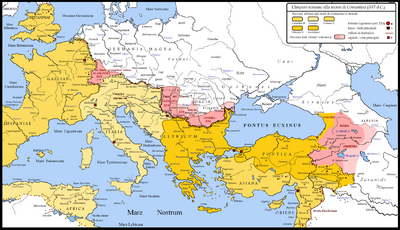
- 357, Roman invasion of Alemannic territory led by general Barbatio and Emperor Julian the Apostate, Attack of Lugdunum (Lyon) by Laeti, End of coordinated operation against the Alemanni, Battle of Argentoratum, Capture of Alemannic King Chnodomarius, Emperor Julian crosses the Rhine at Moguntiacum and forces three Alamannic kingdoms to submit, Franks expelled from the basin of the Meuse.[71]
- 358, Raid in the province of Raetia by Alemannic Juthungi, Destruction of Castra Regina (Regensburg) by Alemanni, Emperor Julian forces the Salian Franks into submission and expell the Chamavi back to Hamaland.
- 359, Execution of Roman General Barbatio, Recapture of Moguntiacum by Julian the Apostate, Emperor Constantius II crosses the Danube at Brigetio (Komárom) and devastates the Quadian lands.[72]
- 365–366, Invasion of Roman Gaul by Alemanni, Alemanni pushed out of Roman Gaul.
- 367, Sack of Moguntiacum by Alemanni, Battle of Solicinium, Roman army led by Eastern Emperor Valens defeats Gothic Greuthungi and captures their king Ermanaric.[73]
- 367–368, Great Barbarian Conspiracy against Roman Britain and Roman Gaul by Saxons and Franks, Death of Nectaridus.
- 367–369, Attack on Gothic Thervingi under Eastern Emperor Valens.[74][75]
- 368, Invasion of Alemannic territory under Emperor Valentinian the Great, Crossing of the Rhine by the Roman Empire.
- 369, Destruction of a fortress near Heidelberg by Alemanni.
- 370, Invasion of Roman Gaul by Saxons, Death of all invading Saxons, Invasion of Alemannic territory by Valentinian the Great, Rome captures thousands of Alemannic Bucinobantes, Deposition of Alemannic King Macrian, Hunnic raids on Gothic Greuthungi.[76][77][78][79][80][81]
- 374, Assassination of Quadic King Gabinius, Invasion of former Illyricum by Quadi and Sarmatians.
- 375, Pillaging of Quadi lands by the Roman Empire, Western Emperor Valentinian the Great dies during peace negotiations.
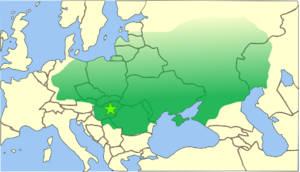
- 376, Invasion of the Huns, Hunnic war against Visigoths and Ostrogoths, Suicide of Gothic King Ermanaric, Gothic King Vithimer dies in battle.[82][83]
- 376–382, Hunnic raids on Gothic Thervingi (Visigoths),[76][77][78][79][80][81] Gothic War,[76][78][79][84][85][86][87] Plundering and destruction throughout the Balkans by Goths.
- 377, Battle of the Willows,[88] Gothic chieftain Farnobius dies in battle.
- 378, Battle of Adrianople,[89][90] Eastern Emperor Valens dies in battle, Begin of the Fall of the Western Roman Empire.[91]
- 377–378, Invasion of Thrace and Moesia by Gothic Greuthungi led by chieftain Alatheus.
- 378, Invasion of Alsace by Alemanni, Battle of Argentovaria, Extermination of Alemannic Lentienses, Alemannic King Priarius dies in battle.
- 380, Battle of Thessalonica, Death of Gothic chieftain Fritigern, Begin of naval raids by Saxons, Begin of the Migration of the Saxons.
- 382, Peace between Rome and the Goths, Large Gothic contingents of Thervingi, Taifali and Victohali settle along the southern Danube frontier in the province of Thrace.
- 383, Failed raid in the province of Raetia by Alemannic Juthungi.
- 387, Failed Invasion of Thrace and Moesia by Gothic Greuthungi led by chieftain Alatheus, Greuthungi chieftain Alatheus dies in battle.
- 390, Massacre of Thessalonica.
- 392, Emperor Valentinian II is hanged, Frankish General Arbogast names Eugenius to be Western Emperor.
- 394, 20,000 Gothic mercenaries support Eastern Emperor Theodosius the Great in the Battle of the Frigidus, Suicide of Frankish General Arbogast, Execution of puppet Western Emperor Eugenius.
- 395, Assassination of Consul Rufinus by Gothic mercenaries.
5th century
For the timeline of events in Britannia after its abandonment by Emperor Valentinian III, see Timeline of conflict in Anglo-Saxon Britain.
- 401–402, Raid in Raetia by Vandals.
- 401–403, Invasion of Italy by Visigoths under Alaric I, Gothic War.
- 402, Gothic Siege of Asti lifted by Stilicho.
- 402, Alaric defeated by Stilicho at the Battle of Pollentia.
- 403, Alaric's army destroyed at the Battle of Verona, Visigoths pushed into former Illyricum by Stilicho.
- 405–406, Siege of Florentina,[92] Battle of Faesulae,[93] Execution of Gothic King Radagaisus,[94] 12,000 Gothic higher-status fighters are drafted into the Roman army.[92][94]
- 406, War between Frankish federates and Vandals, Battle of Moguntiacum, Vandal King Godigisel dies in battle, Alans under King Respendial rescue the Vandals, Invasion of Gaul by Vandals, Suebi, Burgundians and Alans, Fall of Roman Gaul.
- 408, Failed invasion of Moesia by Huns and Germanic mercenaries led by Uldin the Hun, Capture of thousands of Germanic mercenaries, Execution of Roman General Stilicho, Slaughter of wives and children of barbarian foederati, Siege of Rome by Visigoths, Attacks on Roman Britain by Saxons.
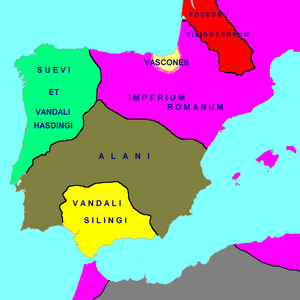
- 409, 2nd Siege of Rome by Visigoths, Invasion of Roman Spain by Vandals, Suebi (Marcomanni, Quadi, Buri) and Alans.
- 410, Sack of Rome by Visigoths, Begin of attacks on Vandals by Visigoths, Begin of Barbarian raids by Picts, Scoti and Irish Celts, End of Roman rule in Britain, Suevi establish a Kingdom in Galicia.
- 411, Jovinus declares himself Western Roman Emperor with aid of the Burgundians, Franks and Alans, Burgundians establish a Kingdom left of the Rhine under King Gundahar.
- 413, Capture of Narbonne and Toulouse by Visigoths led by King Ataulf, Usurper Jovinus is executed, Sack of Trier by Franks.
- 421, Sack of Trier by Franks.
- 422, Capture and Execution of Frankish King Theudemeres by Romans, Attack on Vandals by Romans.
- 426–436, Campaigns against the Visigoths in southern Gaul under Western Emperor Valentinian III, Battle of Narbonne, Capture of Visigothic chieftain Anaolsus.
- 428, Invasion of Northern Gaul by Salian Franks led by King Chlodio.
- 428–431, Failed Roman campaigns against Salian Franks, Alemannic Juthungi on the Rhine and Danube, Germanus of Auxerre leads Romano-Britons to a victory against Saxon raiders.[95]
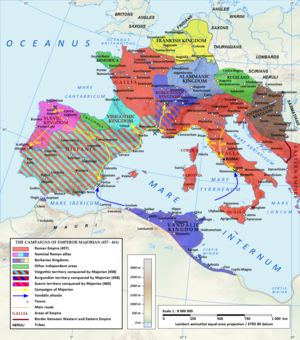
- 429–439, Invasion of Africa by Vandals led by Vandal King Genseric, Siege of Hippo Regius, Capture of Carthage by Vandals, Capture of Roman navy by Vandals, Pillaging of Sicily, Begin of pirate raids by Vandals.
- 431, Invasion to the Somme River by Salian Franks.
- 436–437, Invasion of Burgundian Rhineland by Hun mercenaries controlled by Rome, Burgundian King Gundahar dies in battle.
- c. 443, Britain plunges into civil war, Groans of the Britons, Britain is abandoned by Western Emperor Valentinian III.
- 448, Defeat of the Salian Franks in the Battle of Vicus Helena by Roman General Aëtius, Frankish King Chlodio dies in battle.
- 451, Invasion of Gaul by the Huns with Frankish, Gothic and Burgundian mercenaries led by Attila the Hun, Sack of Trier, Attack on Metz, Siege of Orléans, Coalition of Romans, Franks and Visigoths led by General Aëtius stop the Huns in the Battle of Châlons, Visigothic King Theodoric I dies in battle.
- 452, Invasion of northern Italy under Attila the Hun: Sack of Aquileia, Vicetia, Verona, Brixia, Bergamum and Milan.
- 453, Hunnic and Germanic attacks on Constantinople, Attila the Hun dies during heavy drinking.
- 454, Assassination of Roman General Aëtius, Gepids establish a kingdom in Pannonia.
- 455, Sack of Rome by Vandals, Capture of Empress Licinia Eudoxia by Vandals.
- 456, Visigoths defeat the Suebic Kingdom of Galicia in the Battle of Órbigo.
- 458, Emperor Majorian leads the Roman army to a victory over the Vandals near Sinuessa,[96] Roman victory over the Visigoths in southern Gaul in the Battle of Arelate.
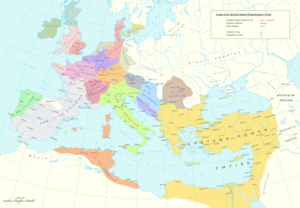
- 459, Seizure of Trier by Franks, Roman reconquest of southern Gaul and most of Hispania under Emperor Majorian.
- 460, Roman victory over the Suebi at Lucus Augusti, Roman fleet is destroyed by traitors paid by the Vandals, Attack on the kingdom of the Vandals cancelled.
- 461, Seventeen Vandal ships destroy forty Roman ships in a surprise attack.
- 463, Battle of Orleans.
- 465, Ostrogothic King Valamir dies in battle.
- 468, Invasion of the Vandal Kingdom by the Byzantine Empire, Defeat of the Byzantine Empire by the Vandals in the Battle of Cape Bon.
- 469, Ostrogoths decisively defeat an alliance of pro-Roman Germanic forces in the Battle of Bolia,[97] Fall of the Hunnic Empire, Visigoths thwarted an attack by an alliance of Bretons and Romans in the Battle of Déols.
- 472, Revolt in Thrace by Ostrogoths led by chieftain Theodoric Strabo.
- 476, Revolt of Heruli, Scirii and Turcilingi mercenaries, Battle of Ravenna, Germanic Heruli chieftain Odoacer becomes King of Italy, Deposition of Romulus Augustulus, the last de facto Western Roman Emperor, Fall of the Western Roman Empire.
- 480, Assassination of Julius Nepos, the last de jure Western Roman Emperor.
- 486, Franks under Merovingian King Clovis I defeat the Kingdom of Soissons in the Battle of Soissons, Fall of the Kingdom of Soissons.
- 489, Theodoric the Great defeats Odoacer in the Battle of Isonzo, Battle of Verona.
6th century
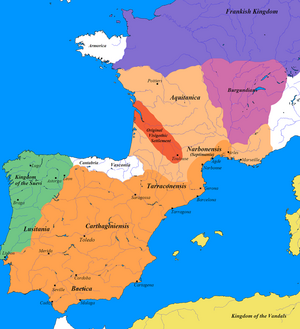
- 526, Raid against Gothic Gepidae by Byzantine General Belisarius.
- 533–534, Invasion of North Africa by the Byzantine Empire, Vandalic War.
- 533, Battle of Ad Decimum, Capture of Carthage by the Byzantine Empire.
- 533, Battle of Tricamarum, Destruction of the Vandal Kingdom by the Byzantine Empire, Fall of the Kingdom of the Vandals.
- 535–554, Invasion of Italy by the Byzantine Empire,[98] Ostrogothic War.
- 535, Capture of Sicily by Byzantine General Belisarius.
- 536, Capture of Naples and Rome by Byzantine General Belisarius.
- 537–538, Siege of Rome by Ostrogoths.
- 540, Capture of Mediolanum and the Ostrogothic capital Ravenna by Byzantine General Belisarius, Capture of Ostrogothic King Witiges.
- 541–542, Bubonic plague wipes out most of the farming community of the former Roman Empire and leaving dead an estimated 25 million people across the world, Begin of territorial decline until the 9th century.
- 541–544, Recapture of Northern Italy by Ostrogoths.
- 542, Battle of Faventia, Battle of Mucellium.
- 543, Siege of Naples.
- 546, Sack of Rome by Ostrogoths.
- c. 548, Recapture of Rome by the Byzantine Empire.
- 549–550, Siege and Capture of Rome by Ostrogoths.
- 551, Battle of Sena Gallica, Capture of Ostrogothic chieftain Gibal, Demoralization of Gothic army.
- 552, Byzantine Empire with aid of the Heruli and Lombards defeat the Ostrogoths in the Battle of Taginae, Ostrogothic King Totila dies on the run, Defeat of Gothic Gepids in the Battle of Asfeld against Lombards (Longbeards), Gepid King Thurisind dies in battle.
- 552–553, Capture of Rome and Siege of Cumae by Byzantine General Narses, Battle of Mons Lactarius, Ostrogothic king Teia dies in battle, Fall of the Ostrogothic Kingdom.
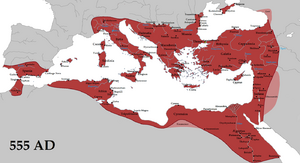
- 552, Justinian sends a force of 2,000 men, led by Liberius, against the Visigoths in Hispania. Conquest of Cartagena and other cities on the southeastern coast and foundation of the new province of Spania.[99]
- 554, Byzantine General Narses defeats the Franks and Alemanni in the Battle of the Volturnus.[100]
- c. 558–561, Failed Uprising of the Ostrogoth Widin.[101]
- 567, Lombards decisively defeat the Gepids, Gepid King Cunimund dies in battle, Fall of the Kingdom of the Gepidae.
- 568–c. 572, Invasion of Italy by a confederation of Lombards, Bavarians, Gepids, Suebi, Heruls, Thuringians, Saxons, Ostrogoths and Rugii.[102] Longbeards (Lombards) establish kingdoms in Northern Italy (Langobardia Major) and in Southern Italy (Langobardia Minor).
- 569, Seizure of Cividale del Friuli, Vicenza, Verona, Brescia and Mediolanum by Lombards.
- 570–572, Siege of Ticinum, Seizure of Tuscany by Lombards. Faroald and Zotto found the Duchies of Spoleto and Benevento.
See also
- Contact between Germanic tribes and the Roman Empire
- Gothic and Vandal warfare
- Anglo-Saxon warfare
- Furor Teutonicus
- Germanic Iron Age
- Germanic Heroic Age
- Timeline of Anglo-Saxon settlement in Britain
- Timeline of Germanic kingdoms in the Iberian peninsula
References
- ↑ 1.0 1.1 Mommsen, Theodor. "History of Rome: Book IV - The Revolution". p. 67. http://italian.classic-literature.co.uk/history-of-rome/04-the-revolution/ebook-page-67.asp. Retrieved 2009-04-18.
- ↑ 2.0 2.1 2.2 2.3 Theodor Mommsen, Römische Geschichte. Vol. 2. Von der Schlacht von Pydna bis auf Sullas Tod.. 3.Ed. Weidmann, Berlin 1861, S. 178. (in German) (Roman History: From the battle of Pydna down to Sulla's death.) Römische Geschichte: Bd. Von der Schlacht von Pydna bis auf Sullas Tod
- ↑ 3.0 3.1 3.2 3.3 Mossman, Theodor (1908). History of Rome. New York: Charles Scribner's SOns. p. 71. http://italian.classic-literature.co.uk/history-of-rome/04-the-revolution/ebook-page-71.asp. Retrieved 9 October 2009.
- ↑ Florus, Epitome 1.38.16-17 and Valerius Maximus, Factorum et Dictorum Memorabilium 6.1.ext.3 (in Latin)
- ↑ Caesar. In: Hans Herzfeld [de; de] (1960): Geschichte in Gestalten (History in figures), vol. 1: A-E. Das Fischer Lexikon [de; de] 37, Frankfurt 1963, p. 214. "Hauptquellen [betreffend Caesar]: Caesars eigene, wenn auch leicht tendenziöse Darstellungen des Gallischen und des Bürgerkrieges, die Musterbeispiele sachgemäßer Berichterstattung und stilistischer Klarheit sind" ("Main sources [regarding Caesar]: Caesar's own, even though slightly tendentious depictions of the Gallic and the Civil Wars, which are paradigms of pertinent information and stylistic clarity")
- ↑ Julius Caesar, Commentarii de Bello Gallico 1.31-53
- ↑ Dio Cassius, Roman History 38.34-50; see also Plutarch, Life of Caesar 19
- ↑ Smith, William (1867). "Ambiorix". in William Smith. Dictionary of Greek and Roman Biography and Mythology. 1. Boston: Little, Brown and Company. pp. 138–139. http://www.ancientlibrary.com/smith-bio/0147.html.
- ↑ Florus, III. 10. § 8.
- ↑ Birkhan, Helmut, 1997, Die Kelten, p. 238. (in German) (The Celts)
- ↑ Dio LI.20.5; LI.21.6
- ↑ Suetonius, Augustus, 23, Tiberius, 12; Tacitus, Annals, I.10, III.48; Velleius II.97, 102; Pliny, Nat. Hist. IX.35 (58); Dio, liv.6.
- ↑ Dio, Roman History, LIV.33.
- ↑ Cassius Dio 229:365, Roman History, Bk LIV, Ch 32.
- ↑ Roller, Duane W. (2006). "Roman Exploration" (Digitized by Google Books online). Through the Pillars of Herakles: Greco-Roman Exploration of the Atlantic. Taylor and Francis. p. 119. ISBN 978-0-415-37287-9. https://books.google.com/books?d=DMPjAyyz1W4C&pg=PA119&dq=name+%22North+Sea%22&lr=&as_brr=3#PPA119,M1. Retrieved 2008-12-08.
- ↑ Interaktive Karte der Römerlager an der Lippe in Ulrike Kusak: Nach Sensationsfund fehlt das Geld für Grabungen, vom 6. Dezember 2014, auf ruhrnachrichten.de
- ↑ Strabo 7, 1, 3; Velleius 2, 108, 2; 2, 109, 2f.; Tacitus, Annals, II.45
- ↑ Cassius Dio, liv. 59
- ↑ Cassius Dio, LV, 6.4-5
- ↑ Suetonius, Augustus 21
- ↑ Tacitus, The Annals 1.44
- ↑ Cassius Dio (1917) (Thayer Lacus Curtius). Roman History. Vol VI Book LV. Loeb Classical Library. http://penelope.uchicago.edu/Thayer/E/Roman/Texts/Cassius_Dio/55*.html.
- ↑ Several examples by Max Ihm, s. v. Cheruski, in: Paulys Realencyclopädie der classischen Altertumswissenschaft (RE) III.2, Stuttgart 1899, cols. 2270–2272. (in German))
- ↑ "Chatti in Encyclopædia Britannica". Encyclopædia Britannica. September 2010. http://www.britannica.com/EBchecked/topic/107997/Chatti#218403.hook.
- ↑ Velleius, Compendium of Roman History, book 2, 104,2.
- ↑ Velleius, Hist. Rom. II, 106. Schmidt, 5.
- ↑ Velleius Paterculus, II.106.
- ↑ Res Gestae Divi Augusti, 5.26.
- ↑ "Legio V Alaudae". www.livius.org. September 2010. http://www.livius.org/le-lh/legio/v_alaudae.html.
- ↑ Wells, Peter S. The Battle that stopped Rome. New York: W.W. Norton & Company. 2003, p. 187 ISBN 0-393-32643-8
- ↑ "The Ambush That Changed History". Fergus M. Bordewich, Smithsonian Magazine. September 2005. http://www.smithsonianmag.com/history-archaeology/ambush.html. Retrieved 2008-10-17.
- ↑ "Germans under Arminius Revolt Against Rome". Edward Shepherd Creasy, The Great Events by Famous Historians, Vol. 2. 1905. http://en.wikisource.org/wiki/The_Great_Events_by_Famous_Historians,_Vol._2/Germans_under_Arminius_Revolt_Against_Rome.
- ↑ Velleius, Hist. Rom. II, 119
- ↑ Velleius Paterculus, Compendium of Roman History II, 120, 4; Cassius Dio, Roman History LVI, 22, 2a-2b
- ↑ Tacitus, Annals 2, 44-46
- ↑ Kevin Sweeney, Scholars look at factors surrounding Hermann’s victory . www.nujournal.com 2010-10.
- ↑ Goldsworthy, In the Name of Rome, p. 269
- ↑ Tacitus 117:189–190, The Annals, Bk XI, Ch 18–19. Events of AD 47–48.
- ↑ Tacitus, Annals, XII.27
- ↑ Tacitus 117:253, The Annals, Bk XIII, Ch 55. Events of AD 54–58.
- ↑ Luttwak, The Grand Strategy of the Roman Empire, p. 53
- ↑ R.Syme, Guerre e frontiere del periodo dei Flavi, pp.606 ss.
- ↑ Frontinus, Stratagemata, I, 3, 10.
- ↑ B.W.Jones, The emperor Domitian, p.129.
- ↑ C.Scarre, Chronicle of the roman emperors, p.77.
- ↑ Dean-Jones, Lesley (1992), p. 144
- ↑ Scott, Andrew (2008). Change and Discontinuity Within the Severan Dynasty: The Case of Macrinus. Rutgers. pp. 25. ISBN 0-549-89041-6.
- ↑ 48.0 48.1 Kulikowski, Michael, 2007, Rome's Gothic Wars, p. 18.
- ↑ Jordanes, The Goths in the Third Century AD in THE ORIGIN AND DEEDS OF THE GOTHS, translated by Charles C. Mierow, www.earth-history.com
- ↑ State, Paul F., A Brief History of the Netherlands, Infobase Publishing, 2008, p. 8
- ↑ Drinkwater (1987), pp. 30, 170.
- ↑ Zosimus, Historia Nova, book 1.43
- ↑ Potter, David S., A Companion to the Roman Empire, p. 270
- ↑ Southern, pg. 129
- ↑ 55.0 55.1 Williams, 50–51.
- ↑ Barnes, Constantine and Eusebius, 7.
- ↑ Grane, Thomas (2007), "From Gallienus to Probus - Three decades of turmoil and recovery", The Roman Empire and Southern Scandinavia–a Northern Connection! (PhD thesis), Copenhagen: University of Copenhagen, p. 109
- ↑ Barnes, Constantine and Eusebius, 29; Elliott, Christianity of Constantine, 41; Lenski, "Reign of Constantine" (CC), 63; MacMullen, Constantine, 39–40; Odahl, 81–83.
- ↑ Barnes, Constantine and Eusebius, 34; Lenski, "Reign of Constantine" (CC), 63–65; Odahl, 89; Pohlsander, Emperor Constantine, 15–16.
- ↑ Barnes, Constantine and Eusebius, 250.
- ↑ Sozomen, Ecclesiastical History, book 1, chapter 8 & book 2, chapter 34.
- ↑ Kulikowski, Michael, 2007, Rome's Gothic Wars, pp. 83-84.
- ↑ Origo Constantini 6.32 mention the actions.
- ↑ Eusebius, The Life of the Blessed Emperor Constantine, IV.6
- ↑ Odahl, Charles M., Constantine and the Christian Empire, chapter X.
- ↑ V.A. Makfield, "L'Europa continentale", in Il mondo di Roma imperiale, edited by J. Wacher, Roma-Bari 1989, pp. 210-213.
- ↑ Y. Le Bohec, Armi e guerrieri di Roma antica. Da Diocleziano alla caduta dell'impero, Roma 2008. p. 52.
- ↑ R.Ardevan & L.Zerbini, La Dacia romana, p.210.
- ↑ Ammianus Marcellinus, Historiae, book 14, chapters 10.
- ↑ Ammianus Marcellinus, Historiae, book 15, chapters 4.
- ↑ John F. Drinkwater, The Alamanni and Rome 213–496, pp. 240–241.
- ↑ Ammianus Marcellinus, Historiae, book 17, chapters 12-13.
- ↑ Gibbon, Ibid. p. 892, 893
- ↑ Ammianus Marcellinus, Historiae, book 27, chapter 5.
- ↑ Kulikowski, Michael, 2007, Rome's Gothic Wars, pp. 115-116.
- ↑ 76.0 76.1 76.2 Zosimus, Historia Nova, book 4.
- ↑ 77.0 77.1 Ammianus Marcellinus, Historiae, book 31, chapter 3.
- ↑ 78.0 78.1 78.2 Philostorgius, Ecclesiastical history, book 9, chapter 17.
- ↑ 79.0 79.1 79.2 Sozomen, Ecclesiastical History, book 6, chapter 37.
- ↑ 80.0 80.1 Heather, Peter, 1998, The Goths, pp. 98-104.
- ↑ 81.0 81.1 Kulikowski, Michael, 2007, Rome's Gothic Wars, pp. 124-128.
- ↑ Heather, Peter, 2010, Empires and barbarians, p. 215.
- ↑ Heather, Peter, 1995, The English Historical Review, The Huns and the end of the Roman Empire in Western Europe
- ↑ Ammianus Marcellinus, Historiae, book 31, chapters 5-16.
- ↑ Socrates Scholasticus, The Ecclesiastical History, book 4, chapters 34-38 & book 5, chapter 1.
- ↑ Heather, Peter, 1998, The Goths, pp. 130-138.
- ↑ Kulikowski, Michael, 2007, Rome's Gothic Wars, pp. 130-153.
- ↑ Hahn, Irene (2007). "The Day of the Barbarians: The Battle That Led to the Fall of the Roman Empire". Book review. Jenson Books Inc. http://romanhistorybooksandmore.freeservers.com/r_day-of-barbarians.htm. Retrieved 2008-04-19.
- ↑ Ammianus Marcellinus, Historiae, book 31, chapters 12-14.
- ↑ Zosimus, Historia Nova, book 4.
- ↑ Roman Empire – Adrianople roman-empire.net. Illustrated History of the Roman Empire. Retrieved April 2, 2007.
- ↑ 92.0 92.1 Heather, Peter, The Goths, p. 205
- ↑ Jaques, Tony. Dictionary of Battles and Sieges: F-O. Greenwood Publishing Group, 2007, ISBN 978-0-313-33538-9, p. 345.
- ↑ 94.0 94.1 Heather, Peter, The Goths, p. 194
- ↑ Butler, Rev. Alban, "St. Germanus, Bishop of Auxerre, Confessor", The Lives of the Saints, Vol. VII, 1866
- ↑ Sidonius Apollinaris, Carmina, V.385–440 and A. Loyen, Recherches historiques sur les panégiriques de Sidonine Apollinaire, Paris 1942, pp. 76–77 and note 5. Cited in Savino, Eliodoro, Campania tardoantica (284–604 d.C.), Edipuglia, 2005, ISBN 88-7228-257-8, p. 84.
- ↑ History of the Goths. University of California Press. 13 February 1990. https://books.google.com/books?id=xsQxcJvaLjAC&printsec=frontcover&dq=History+of+the+Goths&hl=no&sa=X&ei=AAh-T_P3LsSp0QXB2-GVDg&ved=0CC4Q6AEwAA#v=onepage&q=Bassianae%20Dengizich&f=false. Retrieved 5 April 2012.
- ↑ "World Timeline of Europe AD 400-800 Early medieval". The British Museum. 2005. Archived from the original on 2009-02-27. https://web.archive.org/web/20090227014820/http://worldtimelines.org.uk/world/europe/AD400-800. Retrieved 2009-04-06.
- ↑ Getica, 303
- ↑ Haldon, John, 2008, The Byzantine Wars, p. 39.
- ↑ Amory, Patrick, 2003, People and Identity in Ostrogothic Italy, 489-554.
- ↑ De Bello Gothico IV 32, pp. 241-245
Further reading
- Florus on the Germanic wars, translated by E.S. Forster, www.livius.org 2010-10.
- The Germanic Wars, 2nd century, www.unrv.com 2010-10.
- Roman Germanic Wars, 12 BC to 17 AD, www.heritage-history.com 2010-10.
- Timeline of Ancient Europe, www.earth-history.com 2010-10.
- Speidel, Michael, 2004, Ancient Germanic warriors: Warrior styles from Trajan's column to Icelandic sagas. (book)
Licensed under CC BY-SA 3.0 | Source: https://handwiki.org/wiki/History:Germanic_Wars51 views | ↧ Download this article as ZWI file
 KSF
KSF